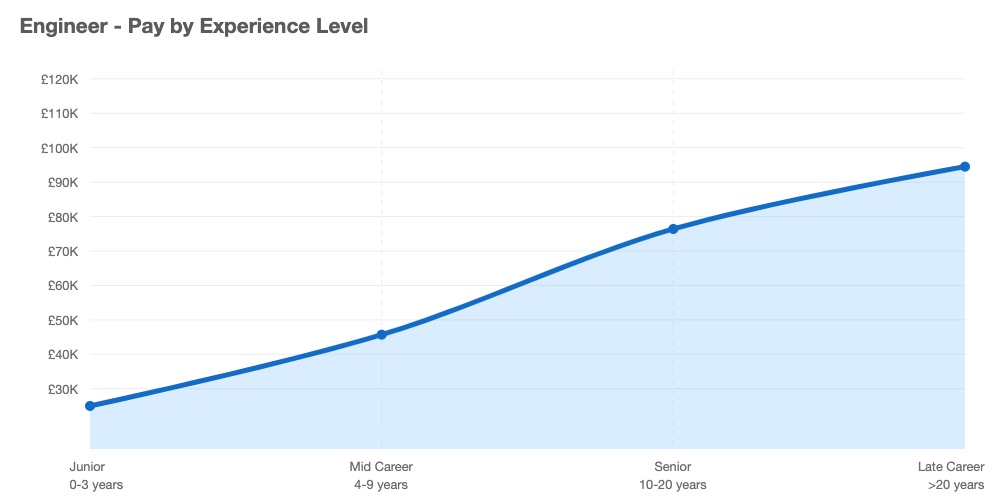Breaking Into the World of Engineering: A Tale of Two Routes
Written by Tom Smith, Managing Director at Advanced Dynamics
In true Advanced Dynamics fashion, I want to start this article with a story.
This story is about my dad. He left school with no qualifications but is a fantastic engineer, a master with anything that involves mechanics. Despite his educational background, he now manufactures components and manages a group of 25 others manufacturing 80% of the hydraulic components that go to JCB.
He can strip an engine down and put it back together in 30 minutes flat with his eyes shut. His mathematical skills are fantastic and after turning to life as an engineer, he’s made an excellent career for himself.
Why is that important? Well, because apparently, there aren’t enough people like my dad anymore in the UK.
In 2021, there was a spotlight shining on the state of engineering in the UK, with a significant part of that focus being on the shortage of quality engineers and the fact that the average age of people within the profession is increasing into the 50s.
However, we recently asked ourselves one question: ‘is engineering becoming cool again?’
Now, in order to answer that question properly, there are a few areas that need to be explored. As part of this article, we looked at the two different routes into engineering to see whether one is preferred over the other. We will also be looking at the role social media is playing in attracting interest in engineering jobs and also what we can do to combat the ongoing shortage of engineers.
So strap in, grab a cuppa and most importantly, read on…
Firstly, why should people think about a career in engineering?
Simply put, engineering has evolved as technology has.
It’s our feeling that, actually, engineering is becoming cool again. People are beginning to understand that it’s not a boring job and a large part of that is down to the technological advancements we have seen over recent years.
Engineering is a very futuristic, almost robotic, career – and that is attracting more youngsters into the industry.
As part of that evolution, there are several benefits to chasing a career in engineering. These include:
High-paying salaries
Let’s start with the financials! According to Jobted, the average engineer salary in the UK in 2022 is £48,000 per year (over 60% of the national average), with juniors and graduates starting around the £24,000 mark.

Caption: Jobted engineer average wage statistics for 2022
If you’re a plasterer, an electrician, or a joiner, those people can name their price in the current market. It’s the same case for engineers in our particular sector. The importance of having a quality engineer has never been higher.
A chance to make a difference
In short, a career in engineering is rewarding, it gives people the chance to solve issues, craft solutions, fix bottlenecks, and make a genuine difference to someone or an organisation.
Hands-on work
For some folk, the thought of sitting behind a desk each and every day is a mind-numbing thought. There isn’t a danger of that with a role in engineering, no matter what field you want to specialise in.
You’ll never be out of a job
As engineering and technology continues to develop and we discover more ways to automate, engineers will forever be required. You’re gaining a skill set that sets you up for life. Anyone fancy a life as a Metaverse engineer?
There are two entry paths into engineering but which one is the right one?
This is something that intrigued us. It’s all well and good for us having an opinion on it, but we wanted to see what the wider thoughts were on this question.
So, we put out an anonymous LinkedIn poll in January and asked our employees to share it in order to get as many participants as possible. We asked…
As a business that employs engineers, which do you value more when filling junior positions… an apprenticeship background or a University engineering degree?
Admittedly, the pool wasn’t huge but, nevertheless, the result we got was not in the least surprising.
Result: 80% of participants said their preference when hiring a junior engineer was an apprenticeship background, while 20% opted for a University engineering degree or engineering courses.
This itself, though, begs another question. Why are apprenticeships favoured within our industry over an educational background?

Is the difference simply that apprenticeships give us more hands-on experience?
‘Getting your hands dirty’.
It’s an old phrase, one often associated with manual labour work. But even in the context of this topic, it would appear that businesses employing first-time engineers would employ someone with years of hands-on experience – even for a junior position.
Why? Because no one has the time to train anyone up.
When asked about this, our very own Malcolm Little said: “Apprenticeships are getting young people through the door of businesses and allowing them to grow as the business grows.
“As part of that, they’re also in a position where they have up to four years more experience working in an industry compared to a graduating University student.
“What we have found is that people are, once again, talking about apprenticeships as a gateway. Our apprentices will learn everything about our business alongside skills that are very portable and transferable across different industries and roles.”
As Malcolm alludes to, here at Advanced Dynamics, we employed three engineering apprentices through the help of Appris Engineering College in August 2020: Conor Linegar, Jedd Kedzierski, and Adam Barrett.
While we will come on to Universities in a little while, below are the top three reasons they gave for why they opted for an engineering apprenticeship scheme rather than furthering their education through university:
- Earning while learning (we wonder why this came out as the first point)
- Gaining new experiences and skill sets
- Strengthening your mindset by facing challenges you wouldn’t in a classroom
Depending on your aspirations, University engineering degrees should not be discounted

As we alluded to earlier, due to the evolution of technology, engineering has become a broad and vague term and nothing like the old misconceptions that hang over it.
There are industrial engineers, biomedical engineers, computer and software engineers, nuclear engineers, and mechanical engineers just to name a few.
However, because of that, it can be difficult to get an apprenticeship in engineering that focuses on one particular area. Engineering apprenticeships, generally, are also vague, designed so the apprentice can get a taste of multiple different disciplines before they decide which direction they want to head in.
For us, this is where University engineering degree programmes are most beneficial – for those aspiring engineers who know exactly where they want to channel their career and efforts into.
The latest statistics on the Complete University Guide also show that there is, actually, a great deal of success with students graduating and moving into their first roles, with the top 10 universities for General Engineering seeing at least 80% of their students going on to land roles in the field.
The full list of top UK universities can be found here. However, below is the current top 10 engineering universities in the UK…
- University of Cambridge
- University of Oxford
- University of Bristol
- Durham University
- University of Sheffield
- University of Warwick
- Loughborough University
- University of Exeter
- Swansea University
- Cardiff University
With plenty of reports talking about a shortage of quality engineers, how do we get more people interested in engineering?
I’m now going to bombard you with some important data.
Back in March 2021, a report carried out by Search Consultancy showed that manufacturing and engineering was the worst affected sector for skills shortages, with 85% of businesses currently feeling the strain from a lack of skilled workers.
Of those surveyed, 40% say that a lack of qualified candidates is the main contributing factor. A further third of managers cite a lack of willing apprentices as a major issue, while 29% list an ageing workforce as a cause for concern.
Let’s stick with the debate around the ageing workforce for a moment.
Further statistics registered in 2020 by Jonathan Lee shows that 19.6% of engineers in the UK are expected to retire in 2026. At the time, job openings in engineering represented 17.1% of all vacancies (2.5 million).
One last statistic (promise)… a report by NewEngineer showed that EngineeringUK has been tracking the annual demand for engineers and technicians needed just to keep pace with infrastructure and other engineering projects.
They estimated last year that 203,000 roles are required annually, made up of 124,000 engineers and technicians with core engineering skills, plus 79,000 related roles requiring a mix of engineering knowledge and other skill sets like project management.
It’s no secret that more needs to be done to promote a career in engineering within the UK. For us, the answer lies in two particular areas: education and social media.
Engineering influencers are a growing trend
You probably had to double-take when you read the words social media.
Bear with us, though, because just as much as the statistics about the current state of engineering don’t lie, neither do the social media trends.
We live in a world that is dominated by it, one in which billions of short videos are being consumed every day on platforms like TikTok and Instagram.
We hopped on to Instagram and TikTok to conduct a simple hashtag research to find out just how popular engineering is on the platform. As of 7th March 22, this is what we found:
|
Instagram (posts with hashtag) |
TikTok (video views with hashtag) |
|
#engineering = 12,108,445 |
#engineering = 4.5 billion |
|
#engineeringlife = 1,005,385 |
#engineer = 2.4 billion |
|
#engineeringmemes = 870,092 |
#engineerlife = 136.9 million |
|
#engineeringstudent = 652,098 |
#engineeringstudent = 195.3 million |
|
#civilengineering = 2,616,928 |
#civilengineering = 639 million |
|
#mechanicalengineering = 1,481,667 |
#mechanicalengineering = 241.1 million |
|
#electricalengineering = 898,114 |
#electricalengineering = 169.3 million |
|
#structuralengineering = 412,667 |
#structuralengineering = 7.6 million |
Note: the above data is correct as of Monday 7 March
This popularity is being driven by a couple of factors: people apparently love a how-to and experiment video and then there are engineering influencers like Mark Rober (761,000 followers) and Colin Furze (445,000 followers), as well as profiles like engineering_everything (198,000 followers), that are leading the way in promoting a career in engineering to a younger audience.
Early intervention is required in schools
What’s scary is that social media is doing a better job than education in engaging the next generation in engineering.
Until recently, it had been neglected for a long time, to the point that most people coming through education leave without knowing how to use power tools and do basic DIY.
Last year, EngineeringUK found that there was insufficient awareness of what engineers do as well as a misperception of what engineering is in schools across the UK. A report also stated that almost half of those between 11 and 19 years old say they know ‘little or nothing’ about what engineers do.
In our opinion, engineering is a necessary extension to the core part of education; like Maths, English and Science.
It also appears that we’re not alone in that thought. Again, we decided to run another LinkedIn poll asking the question…
What do you think needs to change in order to rectify the engineering shortage?
Result: While the pool of respondents was small, 73% said that more intervention was required in schools.
Furthermore, there is a serious-looking group of more than 150 world-leading engineers and scientists, led by Professor Danielle George, urging the Government to help tackle the UK’s engineering skills shortage by embedding engineering into current primary school learning and support #EngineeringKidsFutures.
That group of 150 includes figures like Major Tim Peake, Carol Vorderman, MBE, and will.i.am.
On this, Professor Danielle George said: “This focus and support for schools is fundamental if we want to future-proof the next generation of engineers.”
What we’re encouraged to see is that, despite the shortage, more young people than ever are taking up STEM (Science, Technology, Engineering, Mathematics) subjects in higher education, according to UCAS.
Final thoughts
During the first half of this piece, we evaluated the two key routes aspiring engineers can take into the industry, weighing up the pros and cons of both while providing industry insight into what businesses are looking for.
However, what’s clear is that far more intervention needs to take place if we are to engage younger audiences and get them excited about a career in engineering.
For too long, education in this area has been neglected and as a result, we have a generation in which there are more people that are leaving school with no basic knowledge of DIY than those that are.
As a nation, we’re far less hands-on than we used to be and over time, that has created a burden and reliance on those that have been engineering for years.
In the short term, the engineering industry has some difficult hurdles it needs to overcome. But by incorporating elements of engineering from primary school age and better engaging with tools like social media, we stand a far better chance of engaging Gen-Z and bridging the gap in the long term.


